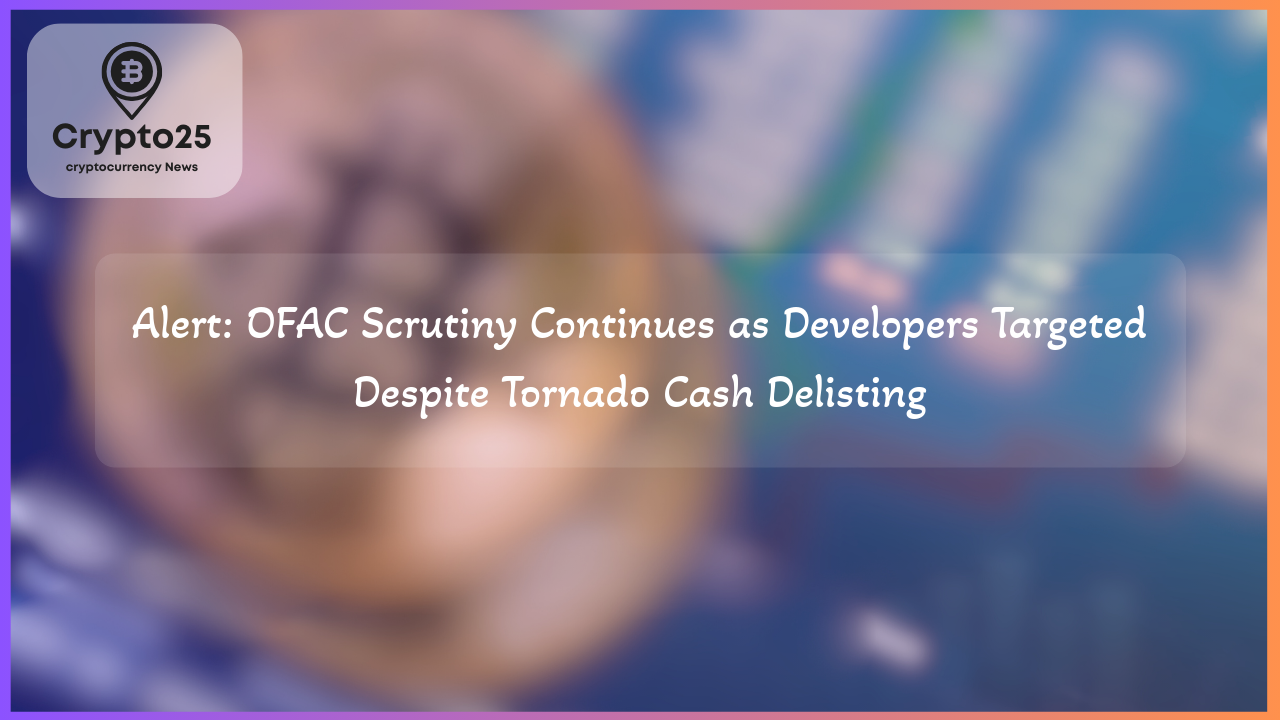
The landscape of decentralized finance (DeFi) and privacy-focused blockchain protocols continues to face significant regulatory uncertainty in the United States. While the recent delisting of Tornado Cash smart contracts by the Treasury Department’s Office of Foreign Assets Control (OFAC) offers some relief, developers of such tools remain under potential regulatory scrutiny. This unfolding situation raises critical questions about the future of decentralized technologies.
### Tornado Cash Sanctions and Their Regulatory Implications
Despite OFAC delisting Tornado Cash’s immutable smart contracts in March, developers and contributors to privacy protocols remain vulnerable to US sanctions enforcement. A report published on April 15 by the DeFi Education Fund reveals that the recent Fifth Circuit Court of Appeals ruling, which found Tornado Cash’s immutable smart contracts do not qualify as property under the International Emergency Economic Powers Act (IEEPA), has not reduced Treasury’s broad discretion.
In its legal filings, the Treasury argued that this ruling was limited solely to immutable components of the protocol. The agency has retained the option to impose sanctions on mutable elements or individuals involved in protocol development. The delisting of Tornado Cash contracts was framed as a discretionary action, leaving the door open to impose sanctions again if conditions shift. This stance underscores the persistent risk that DeFi protocol developers face, particularly those operating outside traditional finance systems.
Adding complexity to the matter is the fact that Roman Semenov, one of Tornado Cash’s co-founders, remains designated under North Korea-related sanctions, showcasing how enforcement may extend beyond immutable contracts. The Treasury’s rationale for this designation stems from alleged indirect assistance to North Korean-linked hackers via decentralized tools, a claim that has introduced further legal ambiguity into the conversation.
### Challenges Developers Face With Evolving Sanctions Standards
The Tornado Cash case has highlighted the challenges for developers navigating unclear regulatory standards. OFAC has exercised expansive authority under Executive Orders 13694 and 13722, which enable sanctions related to cyber-enabled threats and North Korea’s activities. However, the application of these orders to decentralized and open-source technologies remains legally uncertain.
According to the DeFi Education Fund, one key issue is that cyber-related sanctions, as defined by the Treasury, include activities deemed threatening to national security, which can encompass a wide array of behavior. Conversely, North Korea-related sanctions require specific attribution yet still allow broad enforcement actions. OFAC’s lack of clarity on how these regulatory frameworks are applied to DeFi tools has left developers at risk of unintentionally violating US sanctions laws.
For instance, open-source developers whose software is used by sanctioned entities – even without their knowledge or intent – may face legal and financial consequences. The current environment places undue pressure on those creating and managing privacy-enhancing protocols like Tornado Cash, as they operate in a legal gray area with no concrete guidance.
The ambiguity of OFAC’s decision-making processes was further exposed when the agency labeled the Tornado Cash delisting as a discretionary, non-compliant move, emphasizing the lack of a judicial limitation on Treasury’s authority. Instead of setting a broader legal precedent by accepting the Fifth Circuit’s ruling, OFAC pushed for a narrow judgment that exclusively focused on immutable contracts, prolonging uncertainty for the DeFi community.
### Awaiting Final Court Decision on Tornado Cash
While OFAC considers its delisting action on Tornado Cash contracts as sufficient resolution, the matter remains unsettled. A final judgment from the US District Court is pending and could potentially alter the regulatory framework. If the court vacates the original designation entirely, it could limit OFAC’s ability to sanction other immutable contracts or decentralized protocols in the future. Conversely, the Treasury’s preferred narrow interpretation could serve as a precedent, allowing it to reimpose sanctions through alternative justifications.
As the case unfolds, developers of open-source and privacy-focused tools find themselves navigating substantial regulatory uncertainty. The risk of being sanctioned or prosecuted is no longer based solely on intent but also on how their software’s use is perceived. This has created an environment where the scope of liability remains broad, prompting many in the blockchain sector to challenge these regulatory overreaches and advocate for clearer guidelines.
| Title | Details |
|---|---|
| Market Cap | $1.2 Trillion |
### The Future of Privacy Protocols in the Regulatory Spotlight
The Tornado Cash sanctions case represents a critical moment for blockchain privacy tool developers and decentralized technology advocates. While delisting smart contracts has provided the DeFi space temporary relief, the Treasury’s continued focus on enforcement indicates that similar protocols could face future scrutiny. Privacy tools and their developers remain exposed to sanctions-related risks due to the lack of clear legal boundaries.
As blockchain innovation continues to outpace regulations, the global cryptocurrency community will need vigilance, engagement, and advocacy to ensure that the principles of decentralization and privacy are upheld. Transparent legal frameworks will be essential in balancing national security concerns with technological progress in DeFi and privacy-driven blockchain applications. Until then, developers must proceed cautiously, recognizing that the regulatory uncertainty they face poses significant risks to innovation.
